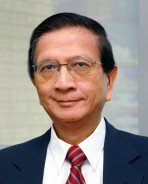

John Dewey wisely remarked that "Every great advance in science has issued from a new audacity of the imagination". Today stands before us a man with abundant audacity of imagination.
Lawrence Chan Chin Bong is, without doubt, one of the most distinguished alumni from our Medical Faculty, whose research into lipid metabolism and diabetes has been of global significance. We are very proud today to associate ourselves with his immense achievements.
Lawrence was born in Hong Kong, the youngest of six children whose parents came from Guangdong. He received his secondary school education at Wah Yan College and demonstrated his enormous potential at an early age being granted a Grantham Scholarship which was awarded to the top twenty out of the approximately 8000 high school graduates who took the School Leaving Certificate Examination. He was subsequently admitted into this University from which he graduated with an MBBS degree in 1966. After graduation he served as house officer in the University Medical Unit under the tutelage of Professor McFadzean, David Todd and Rosie Young and then in the University Surgical Unit under Professor GB Ong. He says that this period of his life had a major impact on him inspiring him to emulate the achievements and ideals of his teachers in patient care, education and research.
After completing his training year at Queen Mary Hospital he left for further clinical training in North America. It was there, in his early years, that he decided to specialise in endocrinology - that is the study of the complex system of hormone producing glands that control basic bodily functions such as metabolism and growth with a view to the successful treatment of their related diseases. Having acquired the basics of biomedical research techniques, he joined Vanderbilt University and teamed up with Dr Bert O'Malley, a rising star in molecular endocrinology. Joining the O'Malley laboratory was an eye-opening experience. It was at the forefront of steroid hormone action and provided an extremely interactive environment in which juniors, like Lawrence, and senior researchers worked side by side with nationally renowned researchers. When Dr O'Malley left Vanderbilt to establish a new department of cell biology at Baylor College in Houston, Texas, Lawrence enthusiastically followed. Indeed his loyalty to Baylor College has been exemplary and thirty-seven years later he is still working there. He is currently Professor of Medicine, Molecular and Cellular Biology and occupies the Betty Rutherford Chair in Diabetes Research.
During his early years at Baylor he initiated a series of pioneering contributions to the fields of lipid and carbohydrate research and their related diseases and introduced molecular biology to lipoprotein research in the 1970s. Subsequently, he reported the cloning of the first apolipoprotein and formulated the now widely accepted apolipoprotein multigene family concept. In 1986 he attained the holy grail of lipoprotein research when he elucidated the structure of apoB-100, an achievement all the more remarkable since it was done by the manual sequencing method before the availability of automated sequencing. The following year, in determining the structure of apoB-48, his team discovered apoB mRNA editing, which was the first instance of RNA editing and a novel genetic pathway in mammals. For his innovative work in lipid metabolism and the cardiovascular field and his published papers in these areas he received many accolades and prizes. In 1993 he was awarded a Doctor of Sciences Degree by this University in recognition of his outstanding research and publications.
Lawrence then turned his attention to the field of carbohydrate metabolism and in 2003 developed a gene therapy strategy which "cured" diabetes in mice. For this discovery he received widespread acclaim in both academic journals and the popular press. He then went on to make a revolutionary discovery that proinsulin producing cells travelled to the nervous system and fused with peripheral nerve cells to promote dysfunction and apoptosis of the nerve cells culminating in diabetic neuropathy. This was a paradigm-shifting discovery in the field of diabetes and diabetes complications.
Again many prestigious awards followed his discoveries including the award of Asian Physician of the Year 2007 from Indiana University and the Astwood Award (2007) conferred annually by the Endocrine Society to an endocrinologist in recognition of excellence in research for his "groundbreaking contributions to the areas of lipoprotein/lipid/carbohydrate metabolism and diabetes and for his long dedication to research in the field of endocrinology".
Lawrence says that he owes a special debt of gratitude to his wife Maria, also a Hong Kong University graduate, who gave up her own career as a teacher to devote herself to her family whilst her husband spent long hours either treating patients or working in his laboratory. It was through her selflessness that their two children, Stephanie and Kenneth, have grown up to follow in their father's footsteps as physicians committed to medical education and patient care.
In reflecting on his life Lawrence firmly believes that he benefited greatly from his early years in Hong Kong and from the standards and values set by his early teachers. He continually returns to Hong Kong to teach and pursue collaborative research with scientists at this University and his continuing affiliation gives him a sense of pride and belonging. He says that today he feels like a prodigal son coming home - a prodigal son of whom we can be justly proud.
Mr Chancellor, it is my privilege and honour to present to you Professor Lawrence Chan Chin Bong for the award of Doctor of Science honoris causa.
Citation written and delivered by Professor Michael Wilkinson, the Public Orator of the University.



